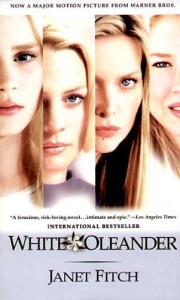 This is Astrid’s story.
This is Astrid’s story.We meet her first when she is twelve and in Ingrid’s (her mother) care.
Ingrid is a woman of such rare, unearthly beauty as to be most likely found in dreams.
Fitch describes her through Astrid’s eyes, gradually, poetically, using very sparse language, as the story unfolds, with words that sing, the pages glistening with the image reflected from her eyes.
The Santa Anas blew in hot from the desert, shrivelling the last of the spring grass into whiskers of pale straw. Only the oleanders thrived, their delicate poisonous blossoms, their dagger green leaves. We could not sleep in the hot dry nights, my mother and I. I woke up at midnight to find her bed empty. I climbed to the roof and easily spotted her blonde hair like a white flame in the light of the three-quarter moon.
I sat next to her, and we stared out at the city that hummed and glittered like a computer chip deep in some unknowable machine, holding its secret like a poker hand. The edge of her white kimono flapped open in the wind and I could see her breast, low and full. Her beauty was like the edge of a very sharp knife.
Ingrid also covets beauty in all its many forms.
Beauty was my mother’s law, her religion. You could do anything you wanted as long as you were beautiful, as long as you did things beautifully. If you weren’t, you just didn’t exist. She had drummed it into my head since I was small.
She becomes so wrapped up in her own world, her own needs that Astrid’s no longer filter through.
We swam in the hot aquamarine of the pool, late at night, in the clatter of palms and the twinkle of the new-scoured sky. My mother floated on her back, humming to herself. “God, I love this." She splashed gently with her fingers, letting her body drift in a slow circle. "Isn't it funny. I am enjoying my hatred so much more than I ever enjoyed love. Love is tempermental. Tiring. It makes demands. Love uses you. Changes its mind.” Her eyes were closed. Beads of water decorated her face, and her hair spread out from her head like jellyfish tendrils. “But hatred, now. That's something you can use. Sculpt. Wield. It's hard or soft, however you need it. Love humiliates you, but hatred cradles you. It's so soothing."
When Ingrid is imprisoned Astrid is fostered out to a series of homes in Los Angeles, her mother, an ever present part of the baggage that she carries with her.
This is such a beautifully written story. So simple, the words arranged to please the ear, one after the other, melodic in their cadence and rhythm. But Astrid’s is not a pretty story.
I gave her to the quiet boy with short cropped hair and straggly beard, followed the fat boy back into the bushes behind the bathrooms. He unbuckled his pants, pushed them down over his hips. I knelt on a bed of pine needles, like a supplicant, like a sinner. Not like a lover. He leaned against the white stucco wall of the bathroom as I prayed with him in my mouth, his hands in my hair.
It is too real, too raw, to conform to anyone’s preconceived notion of beauty. And yet Fitch makes it sing, with her beautiful, simple words.
I left walking backwards so I wouldn’t miss a moment of her. I hated the idea of going back to Marvel’s, so I walked around the block, feeling Olivia's arms around me, my nose full of perfume and the smell of her skin, my head swirling with what I had seen and heard in the house, so much like ours, and yet not at all. And I realised as I walked through the neighborhood how each house could contain a completely different reality. In a single block, there could be fifty separate worlds. Nobody ever really knew what was going on just next door.
As I read this I became overwhelmed with the number of passages that I wanted to secrete away, to take out, and read again. Perhaps that explained the worn and tattered condition of the book I held within my hands, pages yellowing, stained and dog-eared or soiled in some other way by the fingers of less careful readers.
Truly (I have done it several times now) I can let this fall open to any page and find one of these passages.
That was the thing about words, they were clear and specific-chair, eye, stone- but when you talked about feelings, words were too stiff, they were this and not that, they couldn't include all the meanings. In defining, they always left something out.
Don’t miss a word……..read this one for yourselves.




